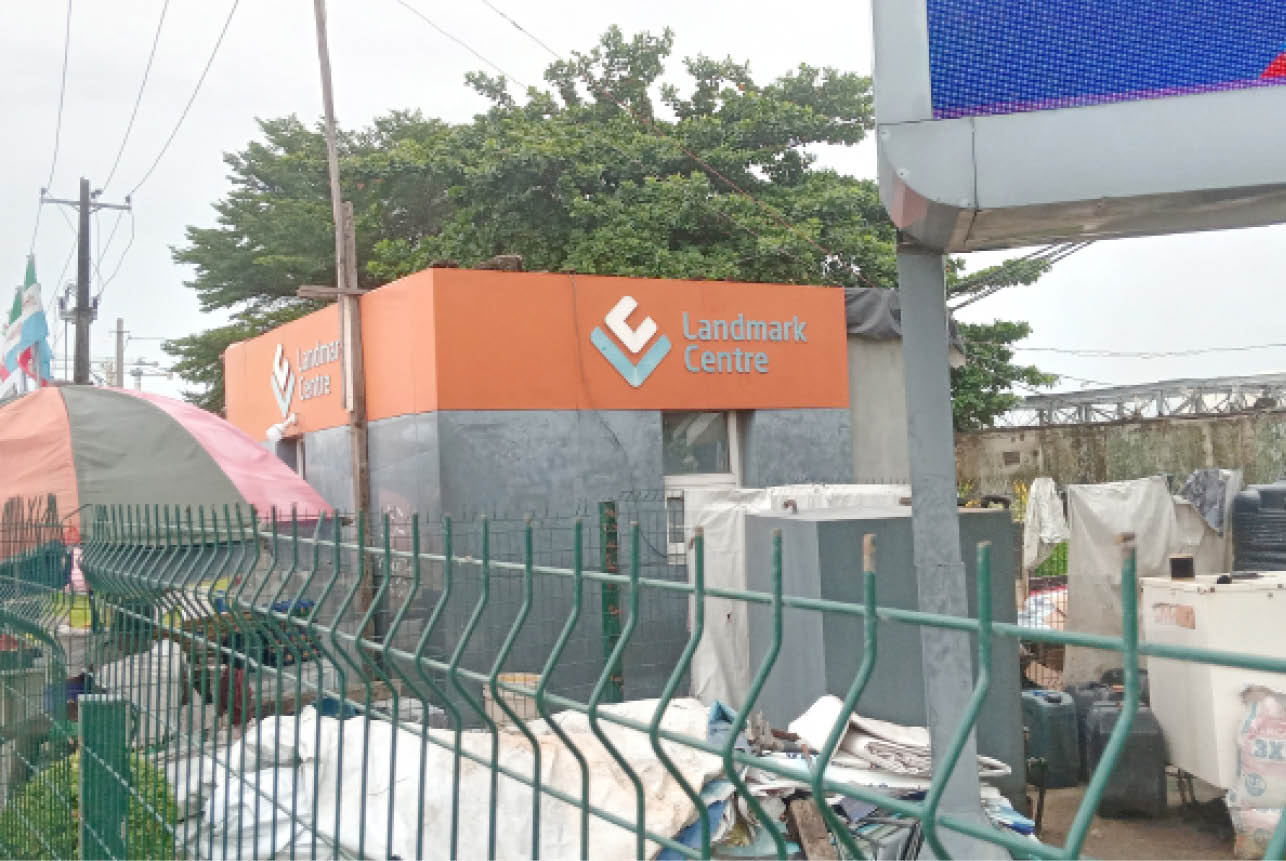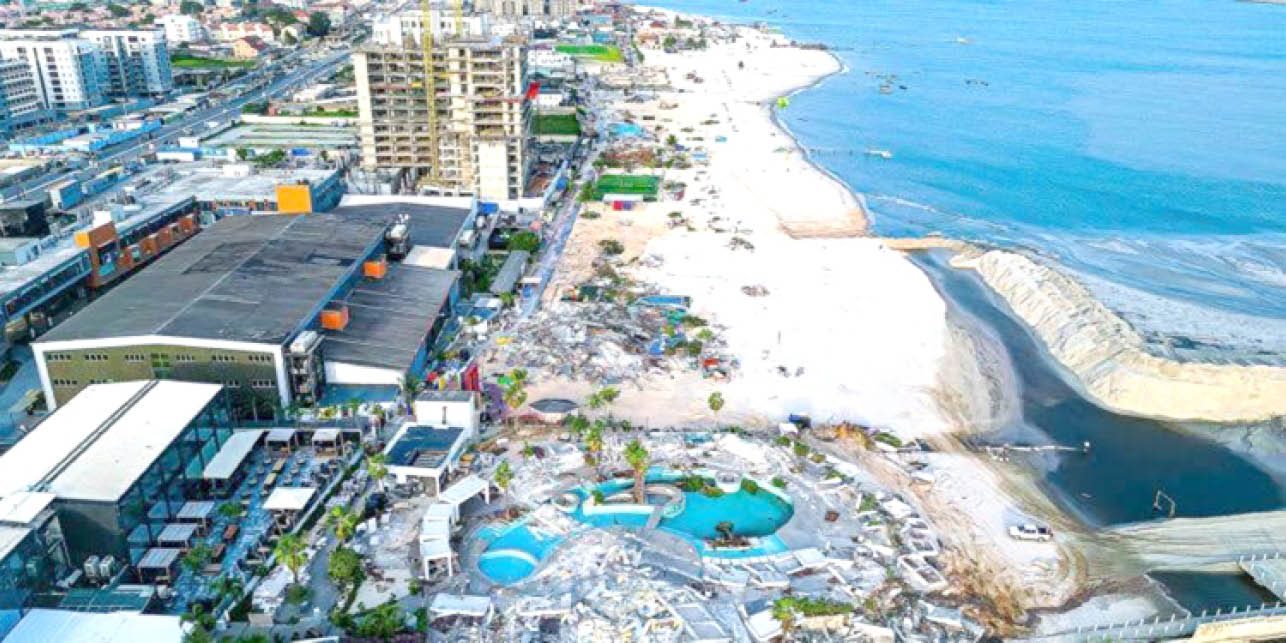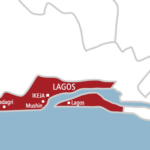“What a journey! What we built in six years was destroyed in six hours. We are overwhelmed at the show of support we have received from Landmark Citizens and all our partners. Thank you for standing with us and believing in our mission and cause so far. This is not the end.”
Above was a post on the X handle of Landmark Africa, counting its losses as Landmark beaches were being demolished for the 700-km Lagos-Calabar coastal road, which has generated controversy in the polity.
The once bustling and busy Landmark beaches were devoid of the usual hustle and bustle on Wednesday, May 1, 2024 when our correspondent visited. Being a public holiday, one would have expected Landmark to be a beehive of activities as was the case in previous public holidays.
But on May 1, the once bustling and buzzing Landmark Beach and Resort was like a ghost town. The usual visitors were nowhere to be found with the luxurious beach and resort deserted. Businesses were shut, while hawkers and vendors milling around the premises were gone.
- Nigerian workers deserve a living wage now
- African Union invites Nigeria, South Africa to bid for AFRIMA hosting rights
Since the controversial Lagos-Calabar coastal road being handled by Hitech Construction Company commenced, many buildings were marked for demolition. The Landmark Resort and Beach, the sprawling hospitality and leisure beach, an investment of $200 million, according to the owner, was the worst hit as the federal government bulldozed properties on the right of way.

The management of the beach and resort earlier called for the reversal to the original master plan of the project to spare the 1.5km stretch of the resort.
The Landmark site is home to over 80 businesses and provides more than 4,000 direct jobs, in addition to generating over N2 billion ($1.5 million) in annual tax revenue.
The Landmark Realty, a property development company managing the firm, lamented the demolition, contrary to the initial plan.
In its ‘Briefing Note on the Lagos-Calabar Coastal Road Construction and the Preservation of Tourism and Hospitality Businesses along the Coastal Right of Way,’ the company called for an in-depth consultation to safeguard the growth of tourism and hospitality industry.
It stressed that the original construction plan for the road – as part of the West Africa coastal highway – was to go through the Water Corporation Road Median, which is still undeveloped.
It, therefore, expressed surprise that the plan was changed to now cut across its ecosystem “with over 80 businesses operating within” it.
It stated, “Landmark acquired beachfront realty along the Water Corporation Road in 2007, and at the time, the original construction plan for the road as part of the West Africa coastal highway was to go through the Water Corporation Road median, which till date remains undeveloped.
“The Landmark Group is now seeking government’s intervention in facilitating the rerouting of just about 1.5km out of the 700km stretch of the road to its original location on the Water Corporation Road median.”
But all entreaties fell on deaf ears as the federal government went ahead with the demolition. The demolition was flagged off last Saturday by the Minister of Works, Dave Umahi, an engineer, despite the controversy and anger that have trailed the project, insisting the Landmark Beach was allocated on the federal government’s right of way.
Other beaches affected were Mami Chula Beach, Breeze Beach Club, Moist Beach and G12 Oniru Beach.
During the commencement of the demolition, Umahi said, “So, with the utmost fear and gratitude to God Almighty and the commitment to President Bola Tinubu’s Renewed Hope Agenda in our infrastructural development agenda in particular, I wish to flag off this demolition.
“It is in a right-of-way within the coastal corridor, which is the legitimate right-of-way of the federal government.
“Before the flag-off of the demolition of the landmark, I graciously increased the grace period by another seven days and another four days; and here we are because the project stopped because of lack of demolition.”
Also, on Wednesday, the federal government began payment of compensation to the owners of the affected properties with over N2.75 billion set aside to be paid. The minister said the payment of compensation was a display of compassion by the federal government as those who built without authorisation were also going to be paid.
“But look at me; by the human face of the Renewed Hope Agenda administration, we are even paying for people that are illegally staying on the coastal line, and do not even have valid infrastructure and documents. That is mercy. You know some people darken counsel without knowledge. You know there’s the devil in the details.
“When you condemn people you bring judgement upon yourself. And that is what he (Obi) has done. And I think he is inciting some of the South East people that are not well informed. He is inciting them. And he gets them into trouble and he doesn’t go to fight for them. Wisdom is a defence. I want our people to have wisdom because I am involved.
“There is no inhumanity meted to Landmark; that matter should be buried because I was there. We fought everything possible. Some people donated property to save his two big infrastructures. That’s appreciation. But some people have taken sides along with him to play politics.”
Daily Trust on Sunday reports that while the Landmark buildings, including the conference centre and the shops were spared, the beach side has completely gone.
Roland Ajetomobi, one of the beach managers, said the demolition of the beach had denied him his means of livelihood.
“The reality is that if this beach goes away, my job is gone, as well as everyone in my team, all the service team and support team members, everyone will lose their job. Most of the business owners are already existing, which means that as from today (when the demolition started), there would not be any opportunity in terms of jobs for their staff,” he said.
It is estimated that over 4,000 jobs, both direct and indirect, have been lost as a result of the demolition of businesses said to be on the right of way of the project. To many of the business owners, their lives cannot be the same again.
Even roadside traders who sell and offer petty services, including Point of Sale (POS), at the gate of Oniru beach in Victoria Island, were lamenting when our correspondents visited.
Since the evacuation of the structures to pave way for the coastal road, Okey Emmanuel, a POS operator, said he had witnessed decline in patronage owing to the disappearance of fun seekers at the beach.
“The closure of the beach affects business owners, even myself as a POS operator. We no longer have many customers, unlike before when people came to the beach,” he said.
The beach, which used to be a beehive of fun seekers during the weekend, has turned into a harbour of tractors and other construction equipment, leaving Emmanuel’s income during the weekend to face a spiral decline from N10,000 to N1,000.
“Sometimes, in a day I could make N10,000 profit or below, depending on the number of people who came to the bridge, but now, it is no longer like that. I struggle to make N1,000. Sometimes, from morning to evening, I may not even see one customer,” he lamented.
Also, Patience Ugwu, a food vendor at the gate of the beach, affirmed that patronage dropped drastically.
“Since the closure of the beach, business has not been doing well like we used to have. Things have really gone bad. Quite a number of people who work here and patronise us are no longer around. Before now, we closed by 11pm or 12am, but now, we go home by 5pm or 6pm,” she lamented.

Ancestral communities face extinction
Apart from businesses that have been impacted, many ancestral homes along the coastal line are crying out over impending extinction. Our correspondents report that the coastal line has many communities surrounding it, with most of them in existence for centuries.
Iwerekun, Awokun, Okun-Ajah, among others, were some of the communities threatened by the ongoing road construction. Residents and leaders of the communities said the new road re-alignment threatened their existence.
Chief Saheed Ologunro of Okun-Ajah community in Eti-Osa Local Government Area, appealed to the federal government to maintain the initial Lagos-Calabar coastal plan designed by the state government in 2006, saying the new alignment negated it.
The community leader, Baale, spoke after the compensation ceremony for the affected residents by the minister in Lagos.
Ologunro explained that the new alignment was affecting the existing communities, which had been there for the past 200 years.
The Baale said: “As at 2006 when we moved in there, the routes for the coastal road were already demarcated. There is a certificate of occupancy that covers where most of the landlords at Okun-Ajah built their structure.
“Surprisingly, there is a deviation from the approved certificate of occupancy of the land from the initial coastal road to the approached area. This means that there is a plan to bring illegality over legality.
“Most of the places they ought to avoid were lands that were not legally approved by the government. If this happens, it means there is an encouragement of fraud.
“We all know that the state has already mapped out plans for the coastal road and we have avoided the initial coastal road.
“Now, the federal government is having a new realignment, which encroaches on the whole village entirely. The whole community is finished by the new alignment.”
Ologunro said that contrary to the description by the Minister of Works, Dave Umahi, the community is not a shanty.
He said, “Is it the village that he is calling a shanty? That is one question there because in a village you don’t have a mansion. We only have bungalows, so maybe it is our village the minister is calling a shanty.”
Ologunro said that if nothing is done after the appeal, the community would not allow them to demolish their houses, adding that they had already briefed their lawyers to go to court.
Also, residents of Iwerekun said their community had existed for about 500 years. They appealed to the federal government to go back to the original alignment to save communities from going extinct.
‘Coastal road good but not urgent’
Amidst the collateral damage that has been recorded as a result of the coastal road project, which is expected to gulp N16 trillion, analysts insist that while it is good to have a coastal road, it shouldn’t be a priority at this time of economic turmoil.
Daily Trust on Sunday reports that from the beginning, the project has been mired in one controversy or another. The award of the contract has also been widely criticised for allegedly not following the procurement process to allow for a competitive bidding, which the federal government has debunked.
A public affairs analyst, Comrade Achike Chude, insisted that the federal government shouldn’t have destroyed businesses for a project that does not even interest many people.
He said, “The idea is good because it is something that has been on the drawing board for a very long time. Obviously, if you open up some routes, businesses and new communities spring up and there is some kind of social and economic life around such a palace. But when you look at two major things in the country today, the parlous state of the economy where the average Nigerian is not able to feed himself, where the government is not able to make good their promise of palliative that will go a long way in alleviating the sufferings of Nigerians, it becomes a problem to understand why the government has to embark on a major infrastructural project when there are alternatives. The alternatives are the existing road infrastructure that need to be fixed and repaired and the government does not even have to spend half of the money they are budgeting for the coastal road to be able to make good use of the alternative infrastructure roads that are already existing.
“When you look at the parlous state of the economy and the fact that the government is borrowing money everywhere and paying heavily in terms of interest on the debt we are owing, the government does not need to embark on this project at all.”
He said the compensation being paid by the federal government could not be commensurate with the values of the properties being demolished.
“If the government is giving compensation of N2.7 billion, how much are the values of the properties they are compensating? First, you determine whether the properties are worth N50 billion, and if they are worth N50 billion and you are paying N2.5 billion, then it is a non-starter in the first place.
“You don’t destroy a business that is generating economic income and has paid billions of naira in taxes to the Lagos State Government and generated a lot of employment for Lagosians that the government will not be able to absorb. What you do is to build around it. How much is it going to cost for them to have done a detour around it and it still remains a tourist attraction as it has been?
“It is unfortunate that our government continues to behave in this manner. It is very clear that the government did not follow the rules of transparency. There is a specific law guiding the issuance of contracts in Nigeria, that is the Public Procurement Act, which makes it very clear that even before then, you also have to run advertisements in some national newspapers.
“All of these things were not done. The issue of impact assessment, and the reasons these things were not done is because of the culture of impunity, that the government, whether at the federal or state level, can do anything and get away with it because nobody can hold them to account.”

 Join Daily Trust WhatsApp Community For Quick Access To News and Happenings Around You.
Join Daily Trust WhatsApp Community For Quick Access To News and Happenings Around You.


